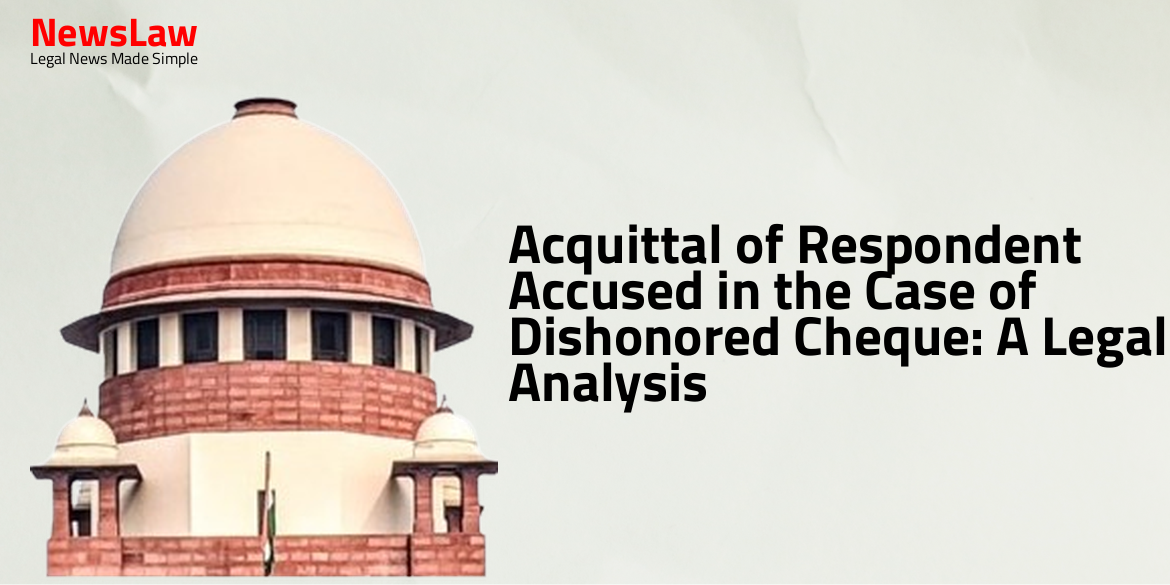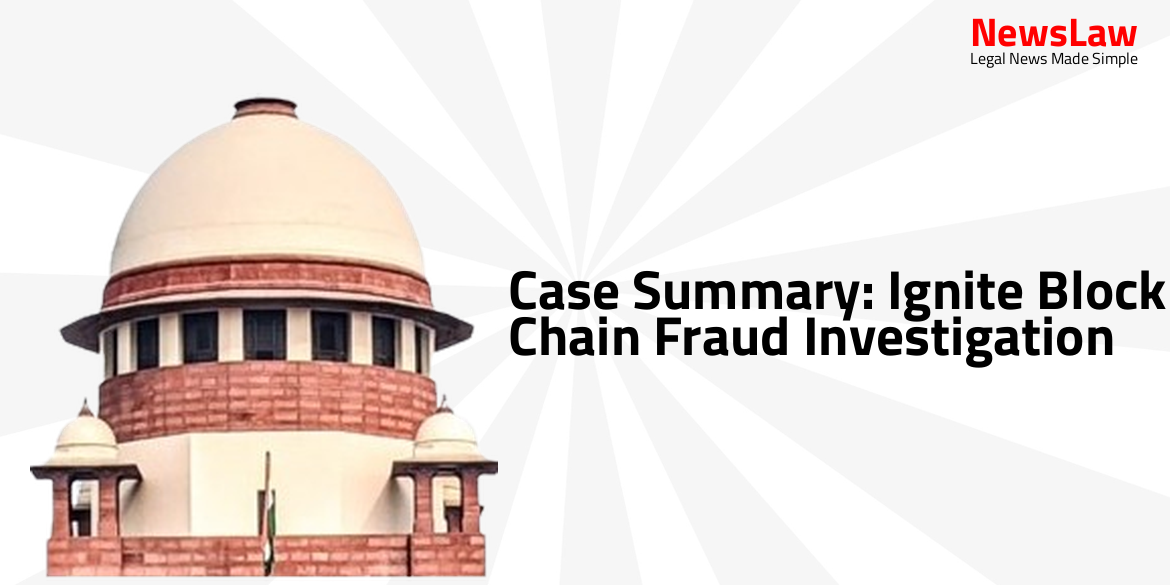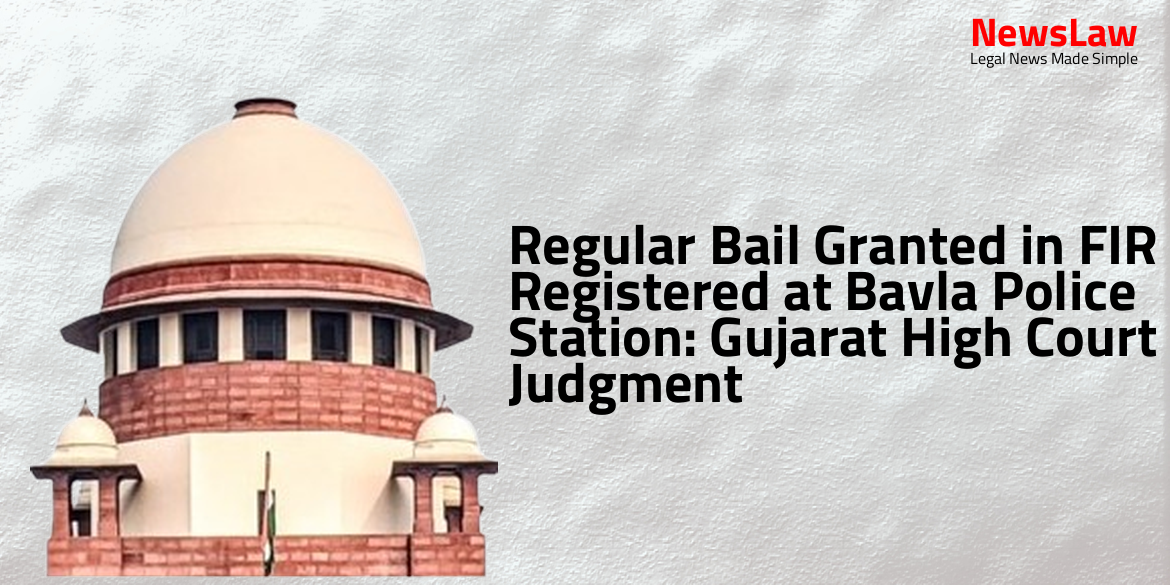Delve into the details of the case where the respondent accused successfully defended against allegations of dishonored cheques in the Gujarat High Court’s judgment. The court’s analysis of the evidence presented and the application of legal principles sheds light on the complexities of the case. Discover how the court evaluated the arguments made by the parties and the significance of establishing a legally enforceable debt in such matters.
Facts
- The applicant, who is the original complainant, filed an application seeking leave to prefer an appeal against the judgment and order of acquittal passed by the learned Judicial Magistrate First Class in a case related to section 138 of the Negotiable Instruments Act.
- The complainant and the accused are in the business of imitation jewelry and have known each other for 15 years.
- The accused borrowed Rs.4,00,000 from the complainant in 2018 and issued a cheque which later bounced due to insufficient funds.
- The complainant filed a private complaint under the N.I. Act after the cheque was dishonored.
- During the trial, the accused claimed that the cheque was given to another individual, not the complainant, and that the complainant had misused the cheque.
- Various documents and statements were presented by both parties to support their claims.
- The judgment of acquittal is being challenged by the original complainant in the present application before the Court.
Arguments
- The learned trial court acquitted the respondent-accused due to failure in establishing a legally enforceable debt by the complainant.
- The respondent-accused successfully proved his defense that the check was given by Ramabhai, the brother-in-law of the complainant.
- The defense’s claim that the check was obtained from Ramabhai was accepted by the court, even though Ramabhai was not examined to verify this claim.
- Two witnesses were mentioned by the respondent-accused in the reply to the demand notice, but none of them were examined during the proceedings.
- Respondent-accused was conducting business of imitation jewelry in the name of Annapurna Jewelers.
- The respondent-accused’s bank statement revealed that the account was closed since 22.11.2019.
- The respondent-accused issued a cheque in 2022 from a closed account in 2019, indicating an intention to deceive the complainant.
- The argument for allowing the appeal and admitting the appeal is based on the inconsistency in the judgment of acquittal.
- The presumption in favor of the complainant was not rebutted by the evidence of business name alone.
Analysis
- The accused has successfully established his defense by creating circumstances and presenting evidence.
- The presumption under section 139 of the N.I. Act helps the court to presume the issuance of the cheque for a legally enforceable debt.
- The burden of proof is on the accused to rebut the presumption, which can be done by preponderance of probability.
- The accused has no business relation with the complainant, as evidenced by lack of entries in records.
- The accused produced bank statements and registration certificates to support his defense.
- The presumption under section 139 is for casting the burden of proof, allowing the accused to adduce evidence to rebut it.
- The standard of proof required in disproving the presumption is preponderance of probability.
- The accused’s evidence can include material on record and circumstances upon which he relied.
- The complainant’s admissions strengthened the accused’s defense.
- The cheques were given in the presence of witnesses but no formal written agreement was executed at the time of lending.
- The doctrine of Pre-Relied is an essential principle in civil litigation.
- Pre-Relied refers to the necessity of a plaintiff to rely upon the case made out in the plaint and not to set up a new case.
- This doctrine ensures that the defendant is not taken by surprise and is aware of the case he has to meet.
- Pre-Relied is crucial for maintaining fairness and avoiding ambush litigation tactics.
- Courts must strictly adhere to the doctrine of Pre-Relied to uphold the principles of natural justice.
- Finding no infirmity or illegality in the impugned order and judgment of acquittal, leave requested is denied.
- Respondent-accused demonstrated that the complaint was filed to gain money at the behest of Ramabhai.
- The complainant admitted the connection between the names of the bank of Ramabhai and the series of cheque numbers in the initial complaint.
Decision
- The registration of the appeal was refused in view of the order passed in Criminal Miscellaneous Application No. 6012 of 2024.
- As a result, the application in question was dismissed.
Case Title: JITESHBHAI JAGMALBHAI CHAUDHARY Vs. STATE OF GUJARAT
Case Number: R/CR.MA/6012/2024



